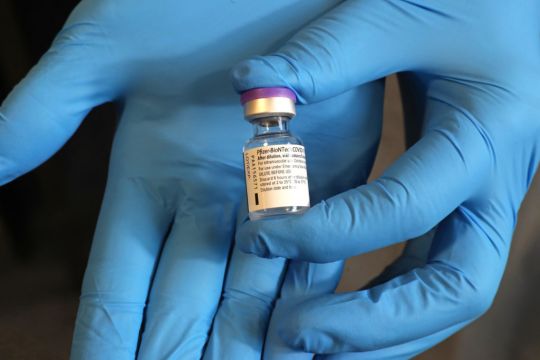There have been a total of 81 reports of suspected side effects associated with the Pfizer/BioNTech vaccine to protect against Covid-19 in Ireland.
Health Products Regulatory Authority (HPRA) chief executive Dr Lorraine Nolan said the Authority had received the reports up to January 11th and all were generally consistent with those typically observed with other vaccines.
The reports of side effects included events of a mild to moderate nature which resolved or were resolving at the time of reporting.
“Among those most frequently reported were abdominal pain, nausea, fatigue, joint pain and pains in the arms, some experience of dizziness, headache, itching and a rash – all consistent with the known and anticipated side effects as emerged during the clinical trials,” she said.
“While the relatively mild effects described are of course uncomfortable for those who experience them, they do pass quickly and generally do not require any medical treatment.”
The risk they present is significantly outweighed by the health risk posed by the virus itself
Advertisement
More than 77,000 doses of the vaccine have been administered in the Republic so far.
Speaking at a briefing of the National Public Health Emergency Team (Nphet) on Monday evening, Dr Nolan said no serious allergic reactions had been reported up to January 11th.
“To date the HPRA has not received any confirmed reports of anaphylaxis, but we can anticipate that as our vaccination numbers continue to increase, we will receive reports of this nature,” she said.
“As always, when discussing potential side effects, we must remember the risk they present is significantly outweighed by the health risk posed by the virus itself.”
New guidance
Also speaking at the briefing on Monday, chief medical officer Dr Tony Holohan called on hospital managers to uphold the "highest standards" in administering Covid-19 vaccines.
It followed criticism of two Dublin hospitals after it emerged that a small number of staff family members were given leftover doses of the vaccine.
Both the Rotunda hospital and the Coombe hospital have said it was done to ensure that no dose was wasted.
New guidance issued recently requires hospitals to have a standby list of 120 healthcare workers for any leftover doses.
“The guidance in respect of the use of the leftover doses, if we can call them that, is about reinforcing the need to ensure that those additional doses would also be targeted to people in... those highest priority groups,” Dr Holohan said.
“We hope that all people in leadership positions would uphold those standards.”
We hope that all people in leadership positions would uphold those standards
On Monday, a further eight deaths and 2,121 new cases of Covid-19 were confirmed in the Republic.
Ireland has made progress in the fight against Covid-19 but not as much as is needed, Dr Holohan warned.
The chief medic said the country cannot afford to take its foot off the gas now, adding that the third wave of the pandemic was resulting in a higher number of people being treated in hospital across all age groups.
The number of people with the virus being treated in hospital passed the 2,000 mark for the first time on Monday.
The 14-day incidence of the virus now stands at 1,404 cases per 100,000 population.
Schools
Asked about the potential reopening of schools for special needs pupils, deputy chief medical officer Dr Ronan Glynn said there are no zero-risk environments when it comes to Covid-19 and that it was a matter of balancing risks and benefits.
“Once you leave your house, once you come in contact with people there’s a risk involved,” he said. “That’s why we’re keen that as many as possible would stay at home.

“But we have to balance risks and benefits. It’s very clear the closure of schools should be a last resort and the protection of education should be a key priority.”
Asked whether he would prefer special needs schools to remain closed at this time, Dr Holohan agreed with Dr Glynn that it was a matter of balancing risks.
“These levels of community transmission that we’re still experiencing, albeit improvement from where we were at the early part of this month at the turn of the year, it’s still a very high level of infection in the community, it still represents a very substantial level of avoidable risk, as far as we can drive down these levels of infection to much lower levels.
“That’s why we all need to follow basic public health advice and to stay at home as much as we can.”







